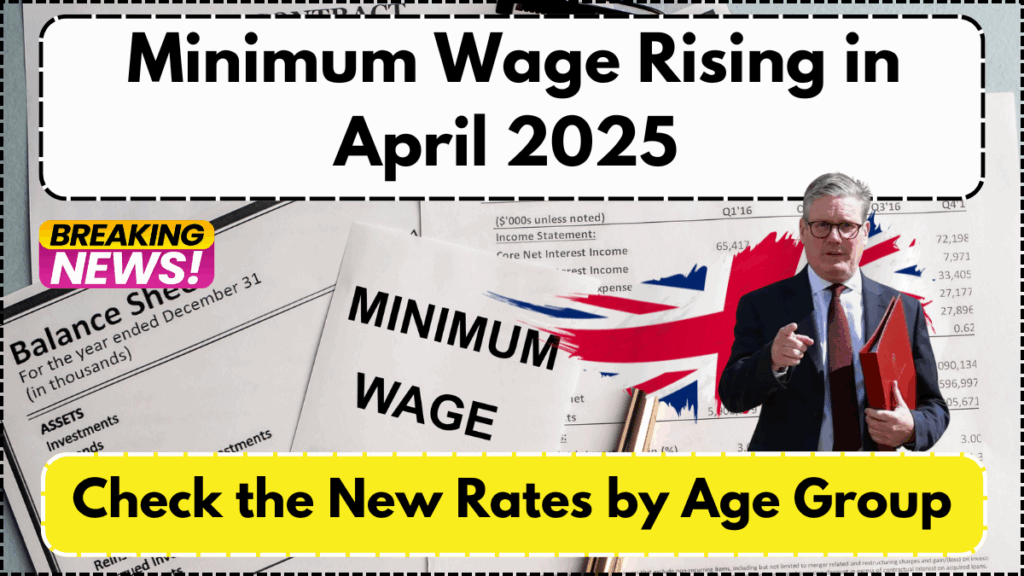Starting April 1, 2025, the UK government is implementing a new wage structure, impacting millions of workers across the country. The latest uk minimum wage increase April 2025 affects both the National Minimum Wage (NMW) and the National Living Wage (NLW), introducing significant salary changes that aim to keep up with the rising cost of living. This move is part of the government’s ongoing efforts to reduce income inequality and ensure fair pay across all age groups.

Why the National Living Wage UK Is Changing in 2025
As inflation and living costs continue to climb into 2025, revising the national living wage UK has become critical. The Low Pay Commission recommended these changes based on economic forecasts, employer feedback, and wage trends. This year’s update reflects a commitment to ensure that work genuinely pays, especially for younger employees who historically earn less. The changes also align with the government’s goal to lift the NLW to two-thirds of median earnings by 2025.
New 2025 UK Minimum Wage Rates by Age Group
The updated wage rates from April 2025 vary by age and employment status. Below is the latest structure:
Age Group | Previous Rate (2024) | New Rate (From April 2025) |
|---|---|---|
21 and over (NLW) | £11.44 | £11.95 |
18 to 20 | £8.60 | ¨9.05 |
Under 18 | £6.40 | £6.80 |
Apprentices (Under 19 or in first year) | £6.40 | £6.80 |
This wage boost affects over 2.7 million workers across the UK. For someone aged 21 or over working 40 hours a week, this increase could result in more than £1000 in additional annual income.
How Employers and Workers Should Prepare
With the uk minimum wage increase April 2025 now in effect, both employers and employees need to make necessary adjustments. Employers must audit their payroll systems and ensure full compliance to avoid penalties. For workers, especially those on part-time or zero-hour contracts, it’s a good time to double-check pay slips and understand what this increase means for weekly and monthly income.
Businesses with tight margins, such as hospitality and retail, may need to reassess pricing models or staffing strategies to absorb the increased labor costs. However, many economists argue that higher wages lead to improved employee retention, productivity, and consumer spending.
Broader Impacts of the 2025 Salary Changes
Beyond immediate take-home pay, the 2025 salary changes can affect Universal Credit entitlements, tax liabilities, and even student loan repayments. For example, higher gross income might push some individuals into new tax brackets or change the amount of benefits they receive. It’s essential to use government calculators or speak with a financial advisor to understand the full implications.
This minimum wage adjustment is also expected to impact job vacancy rates and hiring practices. Some companies may invest more in training and upskilling to get better value from a more expensive workforce. Others may turn to automation in low-wage sectors.
Conclusion: A Step Forward for Fair Pay in the UK
The uk minimum wage increase April 2025 represents more than just numbers—it’s a move toward fairer compensation and economic resilience. As we move through May 2025, both workers and businesses must stay informed and proactive. This wage revision is a signal of the government’s long-term strategy to improve quality of life and reduce in-work poverty.
FAQs
What is the new National Living Wage UK rate for 2025?
The National Living Wage for those aged 21 and over has increased to £11.95 per hour starting April 1, 2025.
Are apprentices included in the new salary changes?
Yes, apprentices under 19 or in the first year of their apprenticeship are now entitled to a minimum of £6.80 per hour.
How will the wage increase affect part-time workers?
Part-time workers will benefit proportionally based on their hours. They should see an increase in weekly earnings depending on the number of hours worked.
Could this affect my Universal Credit or tax payments?
Possibly. An increase in gross earnings could affect benefit eligibility or tax bracket status. Check with HMRC or use an online calculator for precise information.
What should employers do to comply with the changes?
Employers must update payroll systems, notify staff, and ensure all employees are paid at or above the new minimum wage rates by April 1, 2025.
Click here to learn more
